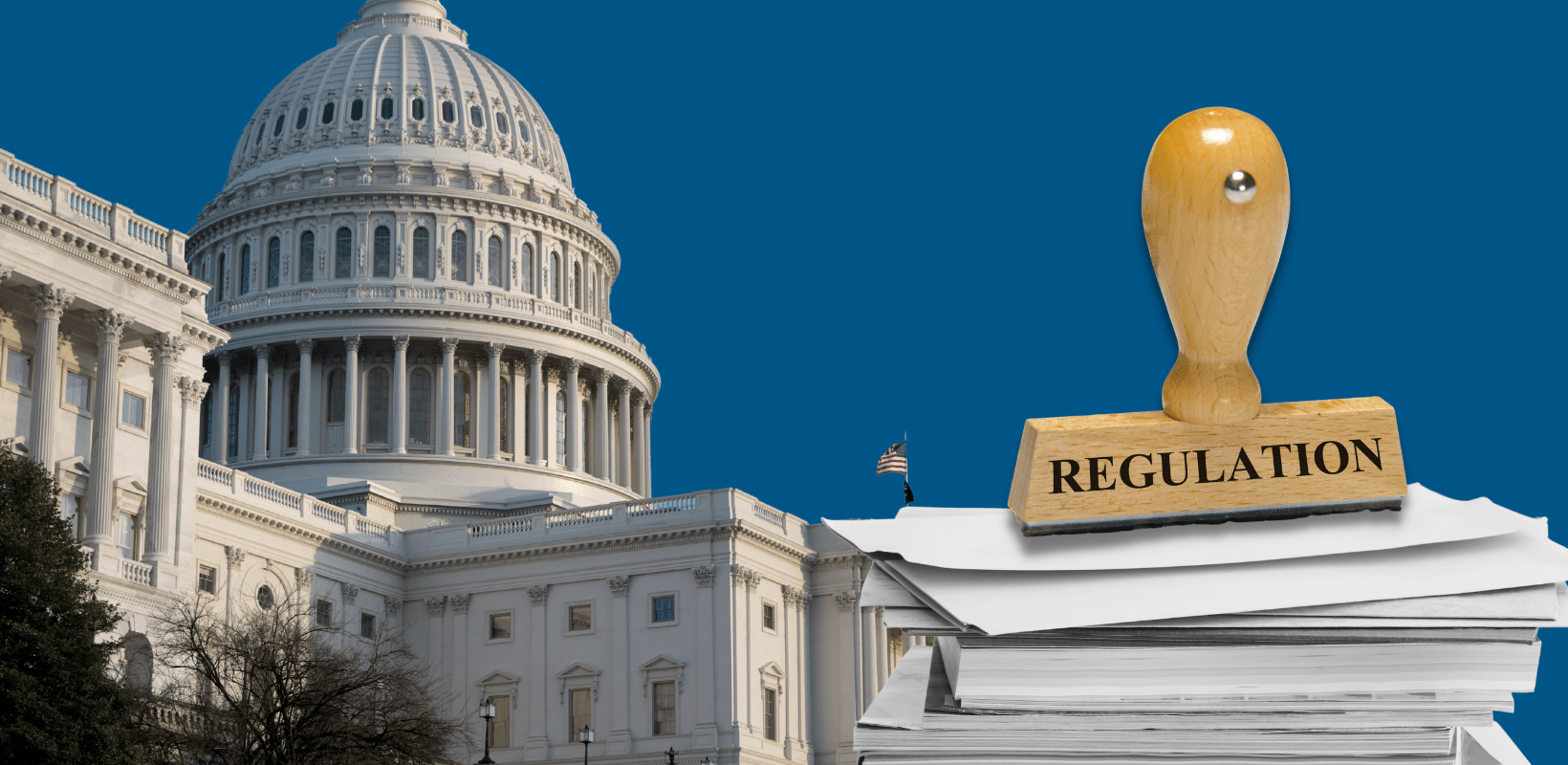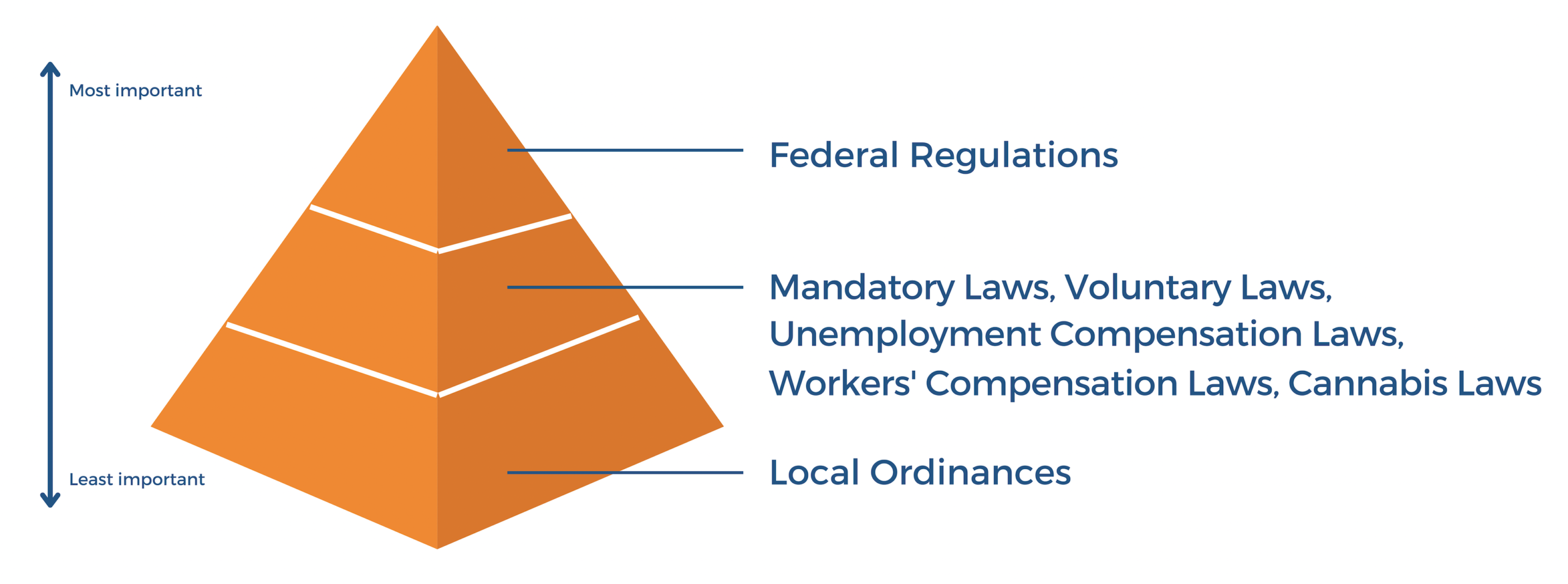Understanding State Laws
Information is provided for educational purposes only. Reader retains full responsibility for the use of the information contained herein.
There are many types of laws that could impact your drug-free workplace program. Understanding what each law type is, as well as how they work together, is an essential part of creating a successful and compliant program.
Voluntary Law
States can choose to either have voluntary laws or mandatory laws. If a state chooses to have voluntary laws, they’re exactly how they sound – voluntary. Employers in the state can choose to comply with the law or laws to receive the benefits offered by the law (usually either a discount on workers’ compensation insurance premiums or limited legal protections).
Sometimes a state may have more than one voluntary law. To receive the benefits offered by the state, employers must comply with all voluntary laws in their entirety. Employers that comply with only a portion of the law(s) are not eligible for the benefits offered by the law.
If an employer chooses to forego the benefits offered by the voluntary law(s), they can test however they choose to, with no regard to the voluntary law.
Mandatory Law
States can choose to either have voluntary laws or mandatory laws. If a state has mandatory laws, employers in the state are required to comply.
Sometimes a state may have more than one mandatory law. In such a case, employers are required to comply with the entirety of each mandatory law. Regardless of how many laws there are, employers must comply with all laws in their entirety or risk legal action.

Industry Specific Law
In addition to voluntary or mandatory laws, a state may have industry specific laws. Some examples of industry specific laws are laws for the mining sector, plumbers, etc. If there is an industry specific law in your state that impacts your industry/workplace, you are required to comply with the law in its entirety.
Case Law
Many states have applicable case law, meaning that courts in the state have ruled on some aspect of a drug-free workplace. Often this can either supplement the existing drug testing law(s), or directly contradict them. Employers are not required to comply with case law in their states, but it is highly recommended that they do so, or risk legal action.
Unemployment/Workers’ Compensation Laws
Sometimes state workers’ and/or unemployment compensation laws include requirements for workplace drug and alcohol testing. More frequently, they include requirements pertaining to drug testing for employers that wish to deny unemployment and/or workers’ compensation claims. These laws can sometimes contain requirements above and beyond the normal state drug testing law, so employers are wise to carefully review these laws if they wish to deny claims.
Medical and Recreational Cannabis Laws
Over half of the U.S. now has some form legal cannabis, whether it be medical or adult-use. Increasingly, these laws contain employee-friendly language that restricts in some form an employer’s ability to drug test for cannabis in the workplace or act on a cannabis-positive test.
Employers must carefully review cannabis laws in their state(s) of business to ensure they are in compliance with both the requirements contained in the workplace drug testing laws as well as any additional requirements outlined in cannabis laws.

Federal Regulations
Depending on your industry, there may be federal regulations, such as those provided by the Department of Transportation (DOT) that you are required to comply with. If you are in such an industry, you must comply with the entirety of the federal regulations that impact your business, regardless of state laws. Read all federal guidelines carefully to ensure compliance with these complicated regulations.
Fitting it All Together
The Supremacy Clause of the U.S. Constitution establishes that state laws are subordinate to federal laws and regulations. Put simply, federal law governs state law; however, this is only the case when federal and state law directly conflict one another. It must be impossible to comply with both federal regulations and state law before a federal regulation overrides a state law.
The same principle applies to state law and local ordinances. State law preempts local ordinances if (and only if) there is a true conflict between the two. If it is impossible to comply with state law and a local ordinance, state law governs.

With 50 states plus territories and countless local governments, the United States will always be filled with diverse and conflicting laws. That’s where Current Compliance comes in. Current Compliance lays out each state law, local ordinance, and more, that may impact your workplace in an easy and accessible way, providing you with all the information you need in one easy place.
This information is provided for educational use only and does not give full details on state drug testing laws . Employers wishing to drug test should consult applicable laws in their entirety prior to creating a drug-free workplace program. Reader retains full responsibility for the use of the information contained herein.
© 2010-2023 The Current Consulting Group, LLC – No portion of this article may be reproduced, retransmitted, posted on a website, or used in any manner without the written consent of the Current Consulting Group, LLC. When permission is granted to reproduce this article in any way, full attribution to the author and copyright holder is required .

